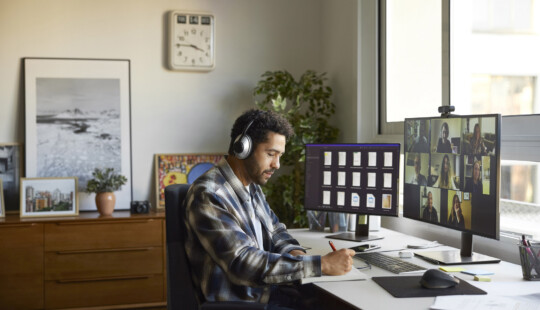Portraits of Angela Merkel, the first female chancellor of Germany who held office for 16 years before stepping down last year, dominate the back wall. The photographer, Herlinde Koebl, portrayed and interviewed Merkel annually for 30 years; a selection of portraits from 1991 to 2008 is on show at the exhibition.
Visitors flocked to these portraits on opening night. Shot in black and white and devoid of the stereotypical feminine attributes of perfectly made-up face, hair, complimentary clothes, or colors, these images condense and edit to the essence of Merkel’s character. Captured by a female photographer, the focus is not on Merkel as female but on the characteristics that made her a powerful politician.
Christa Winter’s modern take on Renaissance women, such as those portrayed by Leonardo da Vinci, concentrate attention very much on gender. During the Renaissance, an era that marked the end of the Middle Ages in Europe, aristocratic urban women had some level of determination over their own lives; they could, for example, have a profession and some measure of control over their finances. Winter captures this growing sense of entitlement and self-confidence in her portraits that are of “body-conscious women, strong, intelligent, beautiful, [who] could be entrepreneurs, bosses, or startup founders, without denying their feminine physicality.”
It’s difficult to tell if the women in Look At Me, by Danielle Zimmermann, are body conscious or not. Is the seated woman posing suggestively or innocently? Is her companion, her face hidden by a head of long and luxurious brown hair, shy or defiant? Knee-length silk tunics reveal their flawless skin, their perfectly shaped legs, and manicures. Delicate hummingbirds are fluttering around them. These idealized portraits would not be out of place on the cover of a glossy magazine, except for the canvas – old cardboard boxes – wash powder, meat, car oil, and tissues, the mundane reality of consumerism clashing with an unrealistic construct of beauty.
Even for visitors unfamiliar with EVA & ADELE, themselves both artists, Birgit Helmy’s sculpture of the couple perched on a gold chair with their egg-shaped shaved heads, matching pink mini dresses, and knee-length red boots gives visitors pause for thought on feminine physicality, gender, and sexuality. EVA & ADELE did not marry until EVA – who has the body of a man – was legally recognized as female. What role does gender play here? In a conversation, the sculptor stresses how important it is to celebrate and defend such gender journeys.
Another of Helmy’s sculptures, Rettungsring (Eng: Lifesaver ring) is a life-size terracotta statue of a young girl in a blue bathing suit with a red lifesaver ring around her waist. With open eyes, she is staring into the distance and, as your mind orders the contents of what you are seeing, you realize that her arms are trapped inside the lifesaver ring, rendering her captive and immobile. She exercises power in the only way possible – in giving us the finger.
Other women do not even have the option of moving a finger in protest: in Phase 2, metal fishhooks stretch lips to create a perfect smile, women are completely absent from the dancing skirts (Broadway) or trapped in a dystopian world (Rituale der Neuenzeit, Eng: New Age Rituals).
These 14 female artists, born between 1935 and 1981, present visitors a wealth of perspectives in this extensive range of works that include sculpture, a video installation, paintings, kinetic installations, and photographs. With this exhibition now open, visitors can experience for themselves – both virtually or in person – how female artists use women and femininity in their art to continually reframe and recalibrate topics such as power, beauty, and gender.
Curated by Alexandra Cozgarea, the exhibition is at the SAP Training Center in Walldorf, Germany, and runs until September 30, 2022. Opening hours are Monday through Friday, 10:00 a.m.-6:30 p.m. Admission is free. In addition, there’s a virtual tour available.



